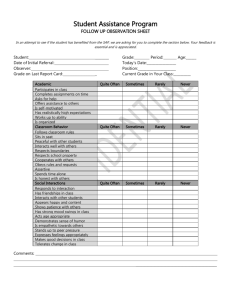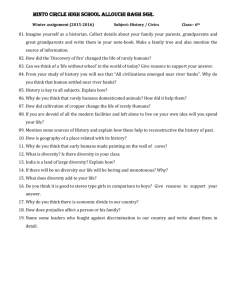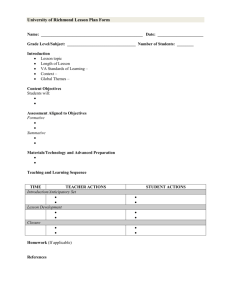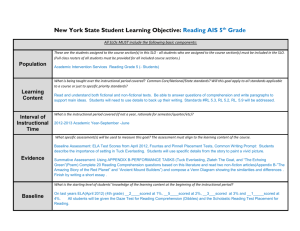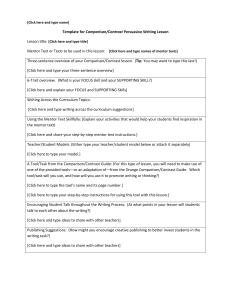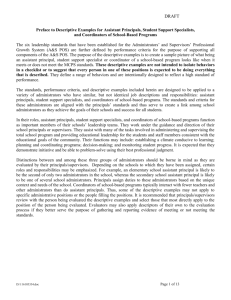Step One: Summative Evaluation from Mentor
advertisement
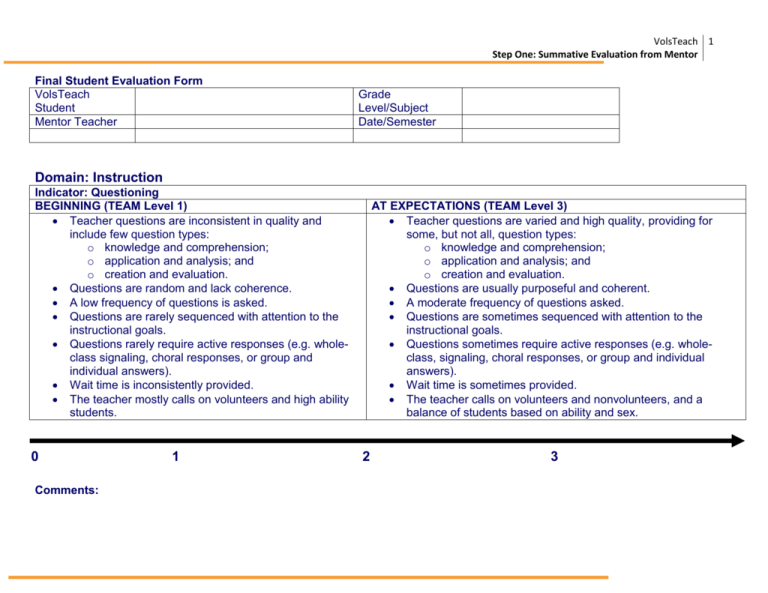
VolsTeach 1 Step One: Summative Evaluation from Mentor Final Student Evaluation Form VolsTeach Student Mentor Teacher Grade Level/Subject Date/Semester Domain: Instruction Indicator: Questioning BEGINNING (TEAM Level 1) Teacher questions are inconsistent in quality and include few question types: o knowledge and comprehension; o application and analysis; and o creation and evaluation. Questions are random and lack coherence. A low frequency of questions is asked. Questions are rarely sequenced with attention to the instructional goals. Questions rarely require active responses (e.g. wholeclass signaling, choral responses, or group and individual answers). Wait time is inconsistently provided. The teacher mostly calls on volunteers and high ability students. 0 Comments: 1 AT EXPECTATIONS (TEAM Level 3) Teacher questions are varied and high quality, providing for some, but not all, question types: o knowledge and comprehension; o application and analysis; and o creation and evaluation. Questions are usually purposeful and coherent. A moderate frequency of questions asked. Questions are sometimes sequenced with attention to the instructional goals. Questions sometimes require active responses (e.g. wholeclass, signaling, choral responses, or group and individual answers). Wait time is sometimes provided. The teacher calls on volunteers and nonvolunteers, and a balance of students based on ability and sex. 2 3 VolsTeach 2 Step One: Summative Evaluation from Mentor Domain: Instruction Indicator: Thinking BEGINNING (TEAM Level 1) The teacher implements no learning experiences that thoroughly teach any type of thinking. The teacher provides no opportunities where students: Generate a variety of ideas and alternatives; or Analyze problems from multiple perspectives and viewpoints 0 Comments: 1 AT EXPECTATIONS (TEAM Level 3) The teacher thoroughly teaches one type of thinking: analytical thinking, where students analyze, compare and contrast, and evaluate and explain information; practical thinking, where students use, apply, and implement what they learn in real-life scenarios; creative thinking, where students create, design, imagine, and suppose; and research-based thinking, where students explore and review a variety of ideas, models, and solutions to problems. The teacher provides opportunities where students: generate a variety of ideas and alternatives; and analyze problems from multiple perspectives and viewpoints. 2 3 VolsTeach 3 Step One: Summative Evaluation from Mentor Domain: Planning Indicator: Instructional Plans BEGINNING (TEAM Level 1) Instructional plans include: few goals aligned to state content standards; activities, materials, and assessments that: o are rarely aligned to state standards. o are rarely logically sequenced. o rarely build on prior student knowledge o inconsistently provide time for student work, o and lesson and unit closure; little evidence that the plan is appropriate for the age, knowledge, or interests of the learners; and little evidence that the plan provides some opportunities to accommodate individual student needs. 0 Comments: 1 AT EXPECTATIONS (TEAM Level 3) Instructional plans include: goals aligned to state content standards; activities, materials, and assessments that: o are aligned to state standards. o are sequenced from basic to complex. o build on prior student knowledge. o provide appropriate time for student work, o and lesson and unit closure; evidence that plan is appropriate for the age, knowledge, and interests of most learners; and evidence that the plan provides some opportunities to accommodate individual student needs. 2 3 VolsTeach 4 Step One: Summative Evaluation from Mentor Domain: Environment Indicator: Respectful Culture BEGINNING (TEAM Level 1) AT EXPECTATIONS (TEAM Level 3) Teacher-student interactions are sometimes Teacher-student interactions are generally friendly, but may authoritarian, negative, or inappropriate. reflect occasional inconsistencies, favoritism, or disregard for students’ cultures. Students exhibit disrespect for the teacher. Students exhibit respect for the teacher and are generally polite Student interaction is characterized by conflict, sarcasm, to each other. or put-downs. Teacher is sometimes receptive to the interests and opinions of Teacher is not receptive to interests and opinions of students. students. 0 1 2 3 Comments: Domain: Instruction Indicator: Motivating Students BEGINNING (TEAM Level 1) The teacher rarely organizes the content so that it is personally meaningful and relevant to students. The teacher rarely develops learning experiences where inquiry, curiosity, and exploration are valued. The teacher rarely reinforces and rewards effort. 0 1 AT EXPECTATIONS (TEAM Level 3) The teacher sometimes organizes the content so that it is personally meaningful and relevant to students. The teacher sometimes develops learning experiences where inquiry, curiosity, and exploration are valued. The teacher sometimes reinforces and rewards effort. 2 3 VolsTeach 5 Step One: Summative Evaluation from Mentor Commments: What are two strengths this student exhibited during the semester: 1.) 2.) What are two areas students should focus their professional growth on for next semester (feel free to offer suggestions on what they can to do grow in the area) 1.) 2.)

